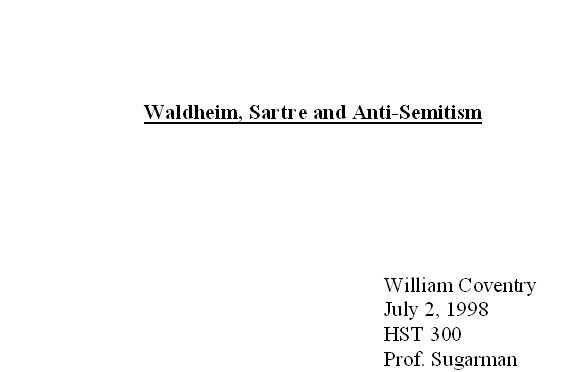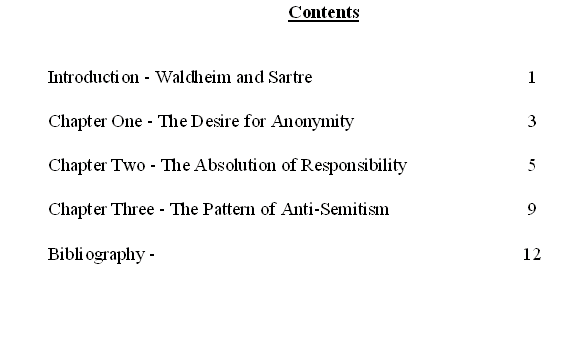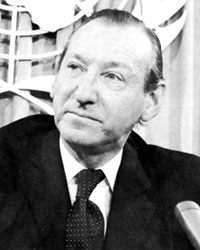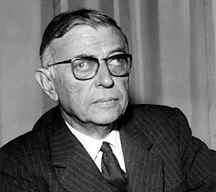| William W. Coventry | home |



Kurt Waldheim

Jean-Paul Sartre
Introduction: Kurt Waldheim as an Example of
Sartre's Anti -Semite
After reading Sartre's brilliant essays on anti-Semitism, it is interesting to analyze an actual historical individual who demonstrated several of these characteristics. This would be the ex-President of Austria and two term ex-Secretary General of the United States, Kurt Waldheim. Considering Waldheim was in charge of an organization devoted to the prevention of genocide, his opinions and passions (Sartre's terms) are well worth noting.
Sartre's essays were published in 1946, one year before Yugoslavia's attempt to prosecute Waldheim for "murder" and being a war criminal. Specifically, the Yugoslav State Commission for the Determination of Crimes Committed by the Occupying Forces and Their Collaborators declared Waldheim was "responsible for the preparation and issuing of ... criminal orders while his group operated in Yugoslavia" (Herzstein 197). Even more specific was that his orders led to "murders and massacres, execution of hostages, deliberate destruction of property [and] burning of settlements" (Herzstein 197). The chairman of the state war-crimes committee, Dr. Dusan Nedeljkovic, asked the foreign ministry "to lodge our registration application with the United Nations Commission for War Crimes in London... emphasizing the special importance we attach to this registration" (Herzstein 197). This was a mere two years after the Preparatory Commission of the U.N. decided, "the Secretary-General should take the necessary steps to ensure that no persons who have discredited themselves by their activities or connections with Fascism or Nazism shall be appointed to the Secretariat" (Hazzard 6).
Waldheim belonged to three Nazi organizations. From the Reich Ministry of Justice a document was uncovered stating he was a member of the SA, the SA Cavalry Troop, and the National Socialist Student Federation (Rosenzwieg & Cohen 35). How is it possible for the U.N. to be so careless? Waldheim became the Secretary General of the U.N. not once, but twice. His membership in Nazi organizations was a historical fact, though relatively well-concealed. Since these particular crimes deal more with Yugoslavian Partisans, and not specifically with anti-Semitism, they are not the primary focus of this paper. The fact Waldheim knew about these atrocities, and lied about this, is well documented. This paper is concerned with the pattern of Waldheim's actions compared with the characteristics described by Jean-Paul Sartre. This is simply one intriguing example of how far a person's characteristics can develop to make himself appear mediocre, anonymous - following orders in order to belong.
Sartre's describes anti-Semites as desiring the absence of certain human qualities that could influence individual thought, freedoms, etc. Sartre does not believe these people enjoy their own opinions, convictions, or passions. They are simply followers. They choose to have their consciousness and judgment decided for them. And one example could be Kurt Waldheim.
Chapter One: The Desire For Anonymity
Kurt Waldheim is an intriguing example of a man desirous of both fame and anonymity. For nearly two years, extremely important war years, very little information is known about him. This lack of documentation is not characteristic of the Third Reich. He was a mid-level officer, with no specific leadership qualifications or outstanding attributes. Though he did receive the King Zvonimir Medal, he embarrassingly rationalized it was given out "like chocolates"( Rosenbaum 253). Though this was patently not true, it does fit with Sartre's characterization, "The anti-Semite is not too anxious to possess individual merit. Merit has to be sought, just like truth; it is discovered with difficulty; one must deserve it... Now the anti-Semite flees responsibility as he flees his own consciousness, and choosing for his personality the permanence of rock, he chooses for his morality a scale of petrified values" (Sartre 27). Although Waldheim later claimed he was the "conscious of the world," (Herzstein 230), his ethics were already set - as when he denied any awareness of the deportation of Jews, which is impossible (Rosenbaum 253, Rosenzweig & Cohen 66, Herzstein 80). Fortunately, a few photos and documents were found, which allows the researcher to gather enough facts to piece together Waldheim's war time experience. Though he stated, after he was injured in Russia was discharged from military service in 1941, in fact he still in active service in the Balkans and in Greece for the next three years (Rosenzweig & Cohen 55-56). Though his desire for remaining anonymity failed, though there is no conclusive evidence establishing him as war criminal.
Once again, this agrees with Sartre:
"He is a coward who does not want to admit his cowardice to himself; a murderer who represses and censures his tendency to
murder without being able to hold it back, yet who dares to kill
only in effigy or protected by the anonymity of the mob..." (Sartre 53).
Waldheim was not singled out for individual combat courage or valor. He was a translator, an interpreter - not a warrior. This fitted in perfectly with his desire for anonymity. As Sartre comments, "His intellectual activity is confined to interpretation (italics by Sartre); he seeks in historical events the signs of the presence of an evil power. Out of this spring those childish and elaborate fabrications which give him his resemblance to the extreme paranoiacs" (Sartre 43-44). Waldheim was a member of arguably one of the greatest military machines of all time. How could the Jews of Salonika be considered an evil power - by any sane military man? Again, this agrees with Sartre: "Thus the anti-Semite takes pains to speak to us of secret Jewish
organizations, of formidable and clandestine freemasonries. Yet
if he meets a Jew face to face, it is as often as not a weak creature
who is ill-prepared to cope with violence and cannot even defend
himself. The anti-Semite is well aware of this individual weakness
of the Jew, which hands him over to pogroms with feet and hands
bound--- indeed, he licks his chops over it in advance (Sartre 46-47).
Though I doubt Waldheim "licked his chops" over the deportations, he transcribed summaries of these historical events, initialed them, and meticulously filed them and sent copies to his superiors. He was an efficient cog in the Nazi war machine, summarizing, reporting and interpreting genocide.
Sartre gives the anti-Semite a reason, albeit questionable, why they behave as they do. According to Sartre, it can be explained partly by the Manichaeism theology. He comments:
The anti-Semite has cast his lot for Evil so as not to have to cast
his lot for Good. The more one is absorbed in fighting Evil, the less one is tempted to place the Good in question... His business
is with Evil; his duty is to unmask it, to denounce it, to measure
its extent. (Sartre 45).
Precisely how the bureaucrat Waldheim may rationalize his wartime activities.
Chapter Two: The Abdication of Responsibility
Waldheim, in his effort to evade any responsibility for the war crimes committed by his unit, pretended he was never there. Unfortunately for him, his pay book, certain photographs, and personally initialed documents placed him right in the focal point of certain massacres. From his point of view, these were not true battles. Most of his experience with battle centered around his desk, initializing the murder or deportations of civilians. He was in no way some kind of evil mastermind or vicious leader of men. He was much closer to the type of anti-Semite Sartre describes. "Authentic liberty assumes responsibilities, and the liberty of the anti-Semite comes from the fact he escapes all of his. Floating between an authoritarian society which has not yet come into existence and an official and tolerant society which he disavows, he can do anything he pleases without appearing to be an anarchist, which would horrify him" (Sartre 33). The Nazis had yet to conquer Greece or the Balkans at this time. The Jews of Salonika lived in a tolerant society, which was decimated during the time Waldheim was stationed there.
While he was in Yugoslavia, 16,000 Yugoslavs were killed in one month, many due to blind reprisals. Waldheim was a staff officer and translator. This was some of the bloodiest and merciless fighting of the war - and what got Waldheim his indictment for murder. He states he forgotten or no longer remembers (Rosenblum 434-36). This may be what Sartre considers, and defines, as escaping responsibility. In all fairness, Waldheim was a follower, not a decision maker. He was not a warrior or a leader of men. For the most part, he was only following orders. He was an administrator, a bureaucrat - in the best Kafkaesque tradition. The guilty were punished, although they were not guilty. Women and children were murdered for sins and crimes they could not possibly commit. Waldheim knew what was going on, as his initial W. was on many of the orders and translations. But these were actions one would not be proud to take responsibility for. This extended excerpt from Eli Rosenbaum's (the General Counsel of the World Jewish Congress) book on Waldheim, illustrates his denials:
"Who could remember everything from the war period?" Waldheim
had asked rhetorically, near the beginning of our investigation.
Certainly not Kurt Waldheim. The still-growing list of memory
lapses and claims of ignorance by this former intelligence officer
(who had been well enough informed to be called upon to brief
General Loehr's chief of staff on developments throughout
Europe and the Mediterranean) was breathtaking, as I fully
realized only when I spent an afternoon compiling a partial list
of them:
He did not know why documents (at least one of which
he signed) listed him as a prewar member of various Nazi
organizations.
He did not know that Yugoslav prisoners captured by
the Italian Division "Pusteria" --- to which he was the sole
German liaison officer --- were handed over to the Germans...
He did not know that Kozara was a massacre site, nor
that civilians were deported en mass to their deaths; indeed,
for some time, he could not remember that he was even at
Kosara. Finally, he contended that he "cannot remember"
whether he was involved in the deportation of women and
children from Kozara.
He never saw any Jews in Salonika wearing the Star of
David. He never even heard about the deportation of Jews from
Salonika and the Greek islands. He did not know that 20
percent of Salonika's population had disappeared, that Jewish
businesses were shuttered, nor that the Jewish cemetery was
destroyed....
He did not know that the deportation of Jews from his
home city of Vienna "was such a mass affair," even though he
claimed to have spent much of the war there, studying law.
The "Black Operation"' in Montenegro was "not in my
memory," nor had he ever heard of General Lueters, the man
whose arrival he was awaiting when he was photographed in
Podgorica....
"Nothing like" Hitler's order to kill captured partisans
(which, it was later established, he recorded in the Athens
command war diary) ever came to his attention.
Regarding the document, found for us by Bob Herzstein
so long ago, showing that Waldheim had briefed Loehr's chief
of staff during a meeting at which the use of hostages as human
shields against partisan attacks on German locomotives was
discussed, Waldheim was unsure "to what extent this matter
was actually implemented."...
He could not recall the 1943 Kalavrita atrocity, even
though he had initialed a report on it.
He "had no idea" that he was accused of Nazi crimes
by Yugoslavia and was listed as wanted by the UNWCC...
When first confronted with allegations regarding the
1968 "Prague telex" (months before an actual copy surfaced),
he could not recall issuing the inhumane order.
He had "no recollection" of discussing his wartime
activities with Brian Urquhart or anyone else at the U.N.
After filling five pages of legal pad with more than
thirty other examples, I abandoned the effort. But I began to
suspect that the "Ic" designation for Waldheim's Army Group
E intelligence assignment actually denoted "Ignorance Chief."
The wonder was that the apparently deaf, dumb, blind - and now
amnesiac - Waldheim had never been court-martialed by General
Loehr. (Rosenbaum 434-36).
According to the 202 page Report of the International Commission of Historians Designated to Establish the Military Service of Lieutenant Kurt Waldheim (February, 1988):
The resulting picture is one of varying proximity to criminal measures and orders under the rules of war... In general, some guilt must arise simply from knowledge of violation of human rights, when the person concerned - through lack of personal strength or courage - neglects his duty as a human being in intervening against injustices...
The commission has received no indication of any case in which Waldheim raised objection to, protested at, or took steps against an order for an injustice of which he was certainly aware, in order to prevent or at least hinder the realization of the injustice. On the contrary, he repeatedly assisted in connection with illegal actions and thereby facilitated their perpetration (Rosenbaum 441).
Or, as Sartre would explain, Waldheim avoided responsibility and authentic liberty. He managed to escape all of that, along with criminal accountability and probable punishment. For a man of who eventually defined himself as the "chief human rights officer of the planet Earth" (Rosenblum 263), this is unpardonable. His job, as an intelligence officer in the center of some of worst human rights violations of the century, was to be at least aware of these things. But as Waldheim saw it, in September, 1990, about the possibility of his resignation due to war crimes, he stated, "Why should I? I haven't done anything wrong. I have a clean conscience" (Rosenbaum 469).
Chapter Three: The Passion for Mediocrity
Kurt Waldheim is in an unique position. Though known as a soldier, a diplomat, the Secretary General of the United Nations and the President of Austria, he is never really known for his brilliance in any of these positions. In fact, he is believed to have been given the job because of his mediocrity. He was not expected to create controvery. This was the time of the Cold War, and both Russia and America could work with him.
Sartre states:
We must remember that a man is not necessarily humble or even modest because he has consented to mediocrity. On the contrary, there is a passionate pride among the mediocre, and anti-Semitism is an attempt to give value to mediocrity as such, to create an elite of the ordinary (Sartre 23).
He chooses the irremediable out of fear of being free; he chooses
mediocrity out of fear of being alone, and out of pride he makes
this irremediable mediocrity a rigid aristocracy.
One of Waldheim's most embarrassing lies is that he never joined any Nazi party organization. Unfortunately, he belonged to the Association of Nazi Students, the SA(Brownshirts) and the SA Cavalry Troop before the war.
This agrees nicely with Sartre's, "The degree of integration of each anti-Semite with this society, as well as the degree of his equality, is fixed by what I shall call the temperature of the community."
Bibliography
Hazzard, Shirley. Countenance of Truth: The United Nations and the
Waldheim Case. New York: Viking, 1990.
Herzstein, Robert Edwin. Waldheim: The Missing Years. New York:
Arbor House/ William Morrow, 1988.
Mitten, Richard. The Politics of Antisemitic Prejudice: The Waldheim
Phenomenon in Austria. Boulder, Colo: Westview Press, 1992.
Rosenbaum, Eli M. and Hoffer, William. Betrayal: The Untold Story of
The Kurt Waldheim Investigation and Cover-Up. New York: St.
Martin's Press, 1993.
Rosenzweig, Luc and Cohen, Bernard. Waldheim. New York: Adama
Books, 1987.
Sartre, Jean-Paul. Anti-Semite and Jew. New York: Grove Press, Inc.
1948.